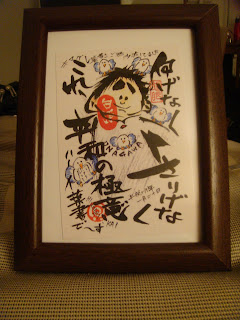The best things in your life do not always occur intentionally. Quite the contrary. Sometimes, what you least expect to be at all meaningful turns out amazing - and Princeton Halftime Retreat 2012 was one of them. The trip was organized by ODUS (Princeton Office of the Dean of Undergraduate Students) to give Princeton sophomores a chance to reflect on their time (three semesters) at Princeton. Never a fan of group life reflection, I signed up for this trip only because I have absolutely no other alternative to spending my Intercession week at Princeton (which would make me die of boredom). The morning I was supposed to depart for the trip, I was still reluctant of my decision, and my stupidity level reached its peak when I decided to check my final grades. 5 minutes before the trip: I decided not to go.
I called a friend. Freaked out. Grades are bad, and future is gone (or so I thought); I freaked out. In a few minutes, she convinced me to go on the trip and get away from Princeton, so I ended up being on a bus taking me on a journey that I was very uncertain about joining. Heck, I put the sadness aside and try to mingle with a group of 20+ Princeton sophomores most of whom I had never seen before. Little do people know/recognize this, but I have a slight fear/anxiety of crowds and making new friends. I do.
This group, unexpectedly, never gave me that anxiety. How so? They made me feel secured. I know many people who are very outgoing, yet never make me feel fully accepted into their friend list. This group is an exception. Even though the people were very different and not all people are outgoing, everyone was so willing to accept me into their world and not just exchange superficial conversations. Certainly, if I could only take one thing away from this experience, I would choose to keep the good memory that we had, from the reflection exercises, the conversations at meals to the Bowling night, Catchphrase and Mafia games. At the end of the trip, everyone has a common fear: once we go back to Princeton, we will forget and ignore each other again. Whether we can keep this relationship or not, I can't guarantee either. But, what I know for certain is, while relationships may fade, memories never die. I'll remember the 72 intense hours that we had.
From a personal perspective, this trip is very special to me because while I always vaguely remember who I am, why I do what I do and who/what is important to me, I never seriously think about them lately. When life kept pushing non-stop, it became hard for me to stop and think, again, of who I am, why I do what I do and who/what is important to me. This trip provides me a chance to do so, and it makes all the difference. When I only remember what's important to me, I live my life like a robot operating on a battery. Being able to think why the robot has to have/rely on that battery in the first place is far more important, because only then do I appreciate the battery. Yes, after this trip I appreciate everything in my life - my passion, my dream, my family, my friends, etc. - so much more.
After this amazing trip, Princeton just grew so much more in me. Most important of all, Princeton offers me the chance to be surrounded by wonderful people, those who possess a unique personality, perspectives, academic passion, musical talents, strong determination to accomplish what they want and, on top of all, a big heart to include all people around them. Besides that, this trip reminds me of how much Princeton cares about each individual student. Had I applied and gone to, say, a school in UK, I would be looking for my own apartment, worrying about my meals, and when I feel sad/depressed, no one would be there for me (Please correct me if I'm understanding it wrong). That is perfectly acceptable, because we are all adults who can take care of ourselves. Princeton, however, goes beyond that. Princeton worries about you before you worry about yourself. At a research university at Princeton, it could be hard to believe that the school cares so much more about a student than his ability to earn high GPA or do research; but it does care. SO MUCH.
Bottom line: Princeton cares about how I am feeling, and that's AWESOME.
I won't say much more, because I have a far more important thing to do than writing this blog post. That is, I must implement what I said I would during the trip to better my life, improve my happiness level and satisfaction. I'll end this note on a quote: "You usually say "I'll be happy after I graduate. I'll be happy after I get a car. But, don't wait for the next time to be happy. Be happy NOW."
Seriously, my happiness level NOW is indescribable. Thank you.















